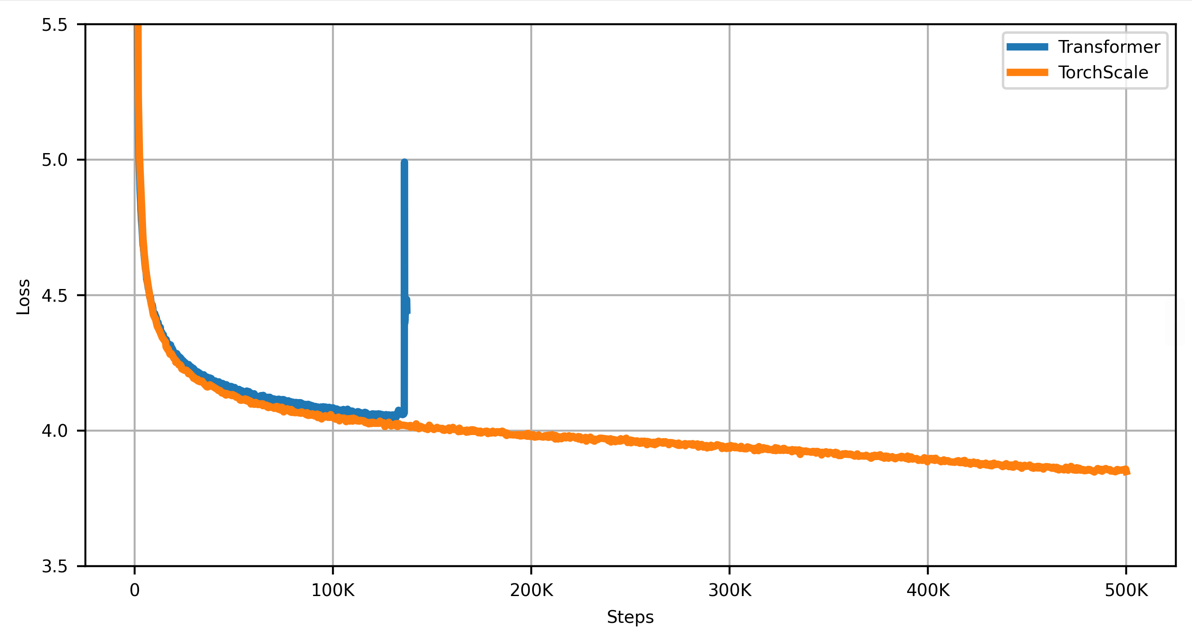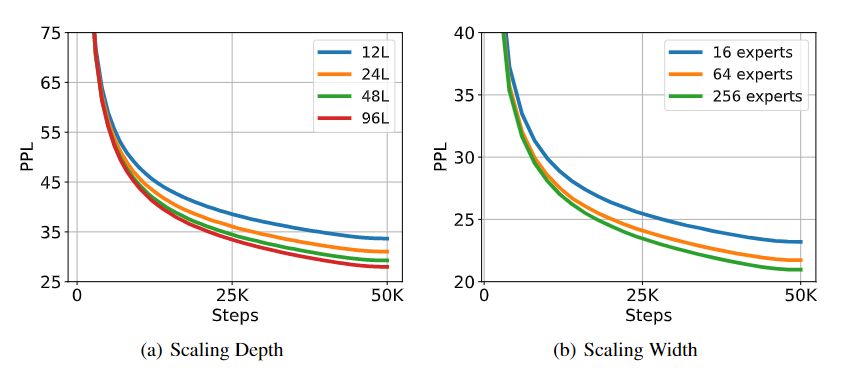
Security News
Fluent Assertions Faces Backlash After Abandoning Open Source Licensing
Fluent Assertions is facing backlash after dropping the Apache license for a commercial model, leaving users blindsided and questioning contributor rights.
TorchScale is a PyTorch library that allows researchers and developers to scale up Transformers efficiently and effectively.
Fundamental research to develop new architectures for foundation models and A(G)I, focusing on modeling generality and capability, as well as training stability and efficiency.
To install:
pip install torchscale
Alternatively, you can develop it locally:
git clone https://github.com/microsoft/torchscale.git
cd torchscale
pip install -e .
It takes only several lines of code to create a model with the above fundamental research features enabled. Here is how to quickly obtain a BERT-like encoder:
>>> from torchscale.architecture.config import EncoderConfig
>>> from torchscale.architecture.encoder import Encoder
>>> config = EncoderConfig(vocab_size=64000)
>>> model = Encoder(config)
>>> print(model)
We also support the Decoder architecture and the EncoderDecoder architecture:
# Creating a decoder model
>>> from torchscale.architecture.config import DecoderConfig
>>> from torchscale.architecture.decoder import Decoder
>>> config = DecoderConfig(vocab_size=64000)
>>> decoder = Decoder(config)
>>> print(decoder)
# Creating a encoder-decoder model
>>> from torchscale.architecture.config import EncoderDecoderConfig
>>> from torchscale.architecture.encoder_decoder import EncoderDecoder
>>> config = EncoderDecoderConfig(vocab_size=64000)
>>> encdec = EncoderDecoder(config)
>>> print(encdec)
It takes only several lines of code to create a RetNet model:
# Creating a RetNet model
>>> import torch
>>> from torchscale.architecture.config import RetNetConfig
>>> from torchscale.architecture.retnet import RetNetDecoder
>>> config = RetNetConfig(vocab_size=64000)
>>> retnet = RetNetDecoder(config)
>>> print(retnet)
DeepNorm to improve the training stability of Post-LayerNorm Transformers
Config class.SubLN for the model generality and the training stability
X-MoE: efficient and finetunable sparse MoE modeling
FeedForwardNetwork layers with the X-MoE layers.Multiway architecture for multimodality
Extrapolatable position embedding (Xpos)
SparseClip: improving the gradient clipping for sparse MoE models
Retentive Network: A Successor to Transformer for Large Language Models
config = RetNetConfig(vocab_size=64000) and retnet = RetNetDecoder(config).Most of the features above can be used by simply passing the corresponding parameters to the config. For example:
>>> from torchscale.architecture.config import EncoderConfig
>>> from torchscale.architecture.encoder import Encoder
>>> config = EncoderConfig(vocab_size=64000, deepnorm=True, multiway=True)
>>> model = Encoder(config)
>>> print(model)
We have examples of how to use TorchScale in the following scenarios/tasks:
Language
Vision
Speech
Multimodal
We plan to provide more examples regarding different tasks (e.g. vision pretraining and speech recognition) and various deep learning toolkits (e.g. DeepSpeed and Megatron-LM). Any comments or PRs are welcome!

The training curve is smooth by using TorchScale, while the baseline Transformer cannot converge.

TorchScale supports arbitrary depths and widths, successfully scaling-up the models without pain.
Some implementations in TorchScale are either adapted from or inspired by the FairSeq repository and the UniLM repository.
If you find this repository useful, please consider citing our work:
@article{torchscale,
author = {Shuming Ma and Hongyu Wang and Shaohan Huang and Wenhui Wang and Zewen Chi and Li Dong and Alon Benhaim and Barun Patra and Vishrav Chaudhary and Xia Song and Furu Wei},
title = {{TorchScale}: {Transformers} at Scale},
journal = {CoRR},
volume = {abs/2211.13184},
year = {2022}
}
@article{deepnet,
author = {Hongyu Wang and Shuming Ma and Li Dong and Shaohan Huang and Dongdong Zhang and Furu Wei},
title = {{DeepNet}: Scaling {Transformers} to 1,000 Layers},
journal = {CoRR},
volume = {abs/2203.00555},
year = {2022},
}
@article{magneto,
author = {Hongyu Wang and Shuming Ma and Shaohan Huang and Li Dong and Wenhui Wang and Zhiliang Peng and Yu Wu and Payal Bajaj and Saksham Singhal and Alon Benhaim and Barun Patra and Zhun Liu and Vishrav Chaudhary and Xia Song and Furu Wei},
title = {Foundation {Transformers}},
journal = {CoRR},
volume = {abs/2210.06423},
year = {2022}
}
@inproceedings{xmoe,
title={On the Representation Collapse of Sparse Mixture of Experts},
author={Zewen Chi and Li Dong and Shaohan Huang and Damai Dai and Shuming Ma and Barun Patra and Saksham Singhal and Payal Bajaj and Xia Song and Xian-Ling Mao and Heyan Huang and Furu Wei},
booktitle={Advances in Neural Information Processing Systems},
year={2022},
url={https://openreview.net/forum?id=mWaYC6CZf5}
}
@article{retnet,
author={Yutao Sun and Li Dong and Shaohan Huang and Shuming Ma and Yuqing Xia and Jilong Xue and Jianyong Wang and Furu Wei},
title = {Retentive Network: A Successor to {Transformer} for Large Language Models},
journal = {ArXiv},
volume = {abs/2307.08621},
year = {2023}
}
This project welcomes contributions and suggestions. Most contributions require you to agree to a Contributor License Agreement (CLA) declaring that you have the right to, and actually do, grant us the rights to use your contribution. For details, visit https://cla.opensource.microsoft.com.
When you submit a pull request, a CLA bot will automatically determine whether you need to provide a CLA and decorate the PR appropriately (e.g., status check, comment). Simply follow the instructions provided by the bot. You will only need to do this once across all repos using our CLA.
This project has adopted the Microsoft Open Source Code of Conduct. For more information, see the Code of Conduct FAQ or contact Furu Wei and Shuming Ma with any additional questions or comments.
This project may contain trademarks or logos for projects, products, or services. Authorized use of Microsoft trademarks or logos is subject to and must follow Microsoft's Trademark & Brand Guidelines. Use of Microsoft trademarks or logos in modified versions of this project must not cause confusion or imply Microsoft sponsorship. Any use of third-party trademarks or logos is subject to those third-party's policies.
FAQs
Transformers at any scale
We found that torchscale demonstrated a healthy version release cadence and project activity because the last version was released less than a year ago. It has 1 open source maintainer collaborating on the project.
Did you know?

Socket for GitHub automatically highlights issues in each pull request and monitors the health of all your open source dependencies. Discover the contents of your packages and block harmful activity before you install or update your dependencies.

Security News
Fluent Assertions is facing backlash after dropping the Apache license for a commercial model, leaving users blindsided and questioning contributor rights.

Research
Security News
Socket researchers uncover the risks of a malicious Python package targeting Discord developers.

Security News
The UK is proposing a bold ban on ransomware payments by public entities to disrupt cybercrime, protect critical services, and lead global cybersecurity efforts.